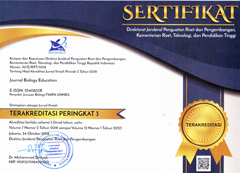The Effectiveness of Bioedutainment Strategies by Biofun Card’s Support on Learning Outcomes and Caring Attitudes for Invertebrate Diversity
Abstract
This study aims to determine the effectiveness of Bioedutainment strategy with Biofun Card's Support on learning outcomes and caring attitude for invertebrate diversity. This research is a Quasi-Experiment with Nonequivalent Control Group Design. The population of this study is all students of class X MIPA of Sint Louis Semarang High School in academic year 2017/2018 which is consisting of two classes. The sample is class X MIPA 1 as the experimental class and class X MIPA 2 as the control class which is determined by the saturated sample technique. The results show that the experimental class student learning outcomes are better than the control class. The experimental class has an average learning outcome of 84.37 with classical completeness of ≥ 85% which reached 93.10%, while the control class is 82.76%. The results of the t-test show tcount 0,000 <0.05,. This indicates that there are significant differences between the control and the experimental classes. N-Gain for the experimental class is ≥ 0.3 with an average of 0.70, while the control class is 0.51. The effectiveness level of the application of Bioedutainment strategy with Biofun Card's support shows students' caring scores of 82.76% (very caring). Students give positive responses to the application of Bioedutainment strategy with Biofun Card's support with an average of 88.95%. Based on the results of the research and discussion, it can be concluded that learning uses the Bioedutainment strategy with Biofun Card's support in invertebrate material to be effective in improving learning outcomes and caring for invertebrate diversity.
The copyright of the article once it is accepted for publication shall be assigned to the journal as the publisher. The intended copyright includes the right to publish the article in various forms (including reprints). The journal maintains the publishing rights to the published articles.
This work is licensed under a Creative Commons Attribution 4.0 International License.







